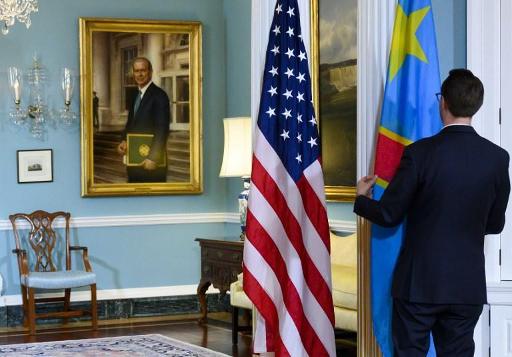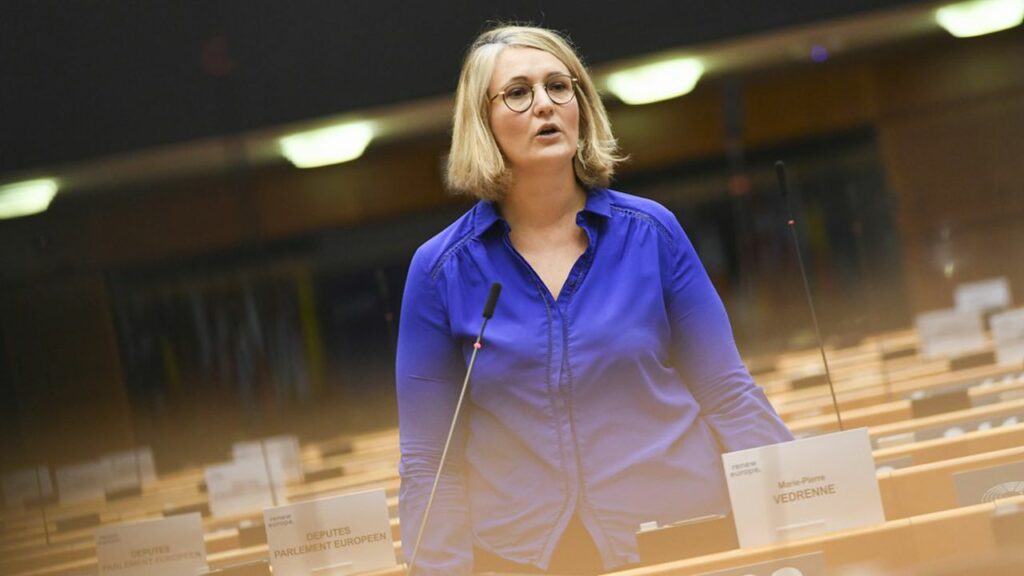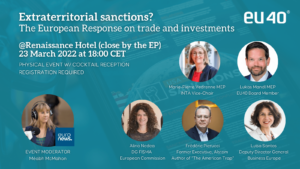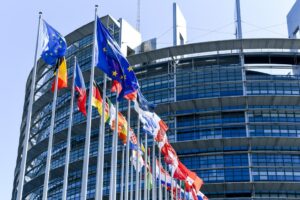Promoted by EU40
Extraterritorial sanctions can have major economic implications, particularly for the European Union, given its institutional vulnerabilities. They affect both European businesses and individuals alike, and ultimately, the sovereignty of the EU and its respective Member States.
Following the European Parliament’s 2020 opinion on ‘Extraterritorial sanctions on trade and investments and European responses,' EU40 has organised an expert-led multi-stakeholder open discussion to explore how European sovereignty can be protected in the face of extraterritoriality, and in particular, how Europe should respond to US extraterritoriality, as we ask, what threat this may pose to EU companies?
The EU40 event will take place in-person at the Renaissance Hotel in Brussels at 6pm this Wednesday March 23rd, register here for the event.
To kickstart the discussion, we asked Marie-Pierre Vedrenne, French Member of the European Parliament for the Renew Europe Group, member of EU40, and host of the debate titled “Extraterritorial sanctions? The European Response on trade and investments,” a few questions.
Marie-Pierre, why is it important to discuss Extraterritorial sanctions for the European Union? Is the debate that EU40 is organizing, relevant?
Extraterritorial sanctions when intended to limit our sovereignty are a problem but not a new one for the EU and the European companies. However, the Commission has published last December a proposal for an anti-coercion instrument that should aim in my view to tackling extraterritorial effects of third country’s sanctions. Moreover, thanks to the European Parliament pressure, the European Commission has put the revision of the Blocking Statute high on its agenda, has included it in its 2022 Work Programme, and should be presented this spring. This is a very timely discussion and I am pleased to deeply share my points of this fight to build a more sovereign Europe.
Economic sanctions have traditionally been used as an instrument of confrontation between state actors in international affairs. However, in the last year, we observed the raise of sanctions instruments not related to “traditional” conflict or warfare but rather aimed at achieving and maintaining economic and technological primacy, beyond the established scheme of international economic competition. Is this a concerning development in your opinion?
This is an extremely concerning development and the EU is not sufficiently equipped to defend its own interests. We need to strengthen our toolbox to counter all unfair practices and coercive and illegal measures. If we want to defend multilateralism and rules-based free trade, we need to be strong to defend ourselves but also the global economic order.
We are currently lacking efficient means of action. It is now time to move from suffering to acting. It is a matter of sovereignty and credibility for the European Union.
A clear example: China. Currently, Lithuania, an EU Member State, is now under unacceptable economic, commercial, and political pressure from China for having made a sovereign choice to strengthen its relations with Taiwan. And we are at an impasse, without any means of action. In the context of the COVID crisis, China did not hesitate to take illegal coercive measures against Australia which denounced Chinese policies, thus violating any rule of their bilateral trade agreement. Some boycott practices in China or in Turkey against European goods and services are also a reality. These are all examples of why we need this new anti-coercion instrument.
In relation to the previous question, in the last 2-3 years, the US has implemented an extensive number of sanctions having extra-territorial effects. What are your considerations on these developments?
Despite the easing of transatlantic relations, we had warned against the common perception that the change in the US administration had removed any risk of new illegal and unilateral measures being taken against European sovereignty. Section 301 still exists in the US law and the Biden administration will not hesitate in using it in order to defend the US interests.
This is why we absolutely need to revise our instruments. The reality is that INSTEX and the Blocking Statue are completely ineffective in responding to the real issues. Our companies, Airbus, Alstom, BNP Paribas, to name but a few, are still facing unacceptable difficulties.
I would like to make here a distinction that will be fundamental to better understand how I see the articulation between the Blocking Statute review and the anti-coercion instrument. The United States takes advantage of its legislation to deviate from its main goal and impose on everyone, Europeans included, their goal. There is a double objective: put pressure on companies to force them to leave a market but also make public authorities such as the EU and Member States adopt similar sanctions. This should be tackled by the anti-coercion instrument while the Blocking statute must allow our companies that respect the international law to do their business. There are two different levels of coercion and two different objectives.
European companies have been caught in the “cross-fire” of the trade war, for example between the US and China. How the EU could protect the freedom of EU economic businesses to decide on their business strategies?
Our agenda is clear: we need to build our strategic autonomy and our European sovereignty. In order to defend our values and interests as well as to achieve our goals such as the fight against climate change, we must be able to choose on our own how, with whom, and when we build a partnership with a third country. It is up to no one else except us to decide with whom we trade and on what basis. That means concretely making sure that our companies are defended if they do business in compliance with international law and to tackle all the unfair competition practices. This goes from the very soon in place international public procurement instrument to gain in reciprocity, to the latest proposal of an instrument to tackle the distortive effects of foreign subsidies. We should not say that these instruments are targeted to any partner, we just want to be well equipped to make all our partners to stand by the rules, internationally defined and recognised.
While we discuss how the EU can protect itself from the extra-territorial effects of sanctions, we must also consider what fundamental principle of law could underpin such a defence. For example, the EU legislator may consider a principle of “threat to EU economic order and security” (similar to the concept used by the US to justify the adoption of its sanctions), in case of compliance with extra-territorial measures by economic operators. What is your opinion in this sense?
I strongly support the definition of coercive measures introduced by the Commission in its proposal on anti-coercion. I think it covers many realities. Any economic or commercial measure taken by a third State in disregard of and in violation of international law against a Member State or the Union as a whole with the aim of forcing the Union to change its internal or external policy will be considered as economic coercion. This is an excellent basis for this instrument to be effective, especially in its deterrent nature. Indeed, we need a nuclear weapon if we want to be convincing. The threat of countermeasures is the basis of the instrument and allows for dialogue and negotiations with the third country. We do not want a trade war. Dialogue first. But if it fails, we will be able to react and defend our interests.

Would you see the European Parliament having an extensive debate and expressing an opinion on the use of extra-territorial sanctions for economic objectives?
I have always been very vocal, in the European Parliament, and especially in the International Trade committee, on the extra-territorial sanctions and also on coercion. The revision of the Blocking Statute and the proposal for an anti-coercion mechanism are on the table thanks to our mobilisation. I was the European Parliament rapporteur on the Enforcement regulation revision. The objective was to overcome the WTO deadlock and to give the EU the capacity to impose counter-measures in the context of a WTO dispute blocked in the Appellate body. With the Member States and the Commission, we succeeded in making the EU more credible and efficient with the possibility to take measures not only in the areas of goods and public procurement but also in the services sector and intellectual property rights harmonised at European level.
Working on this file, one of my main objectives was to introduce preliminary or provisional measures when the EU is facing illegal and unilateral measures, without waiting for a WTO ruling. I already wanted to use this legislation to strengthen the European Union against economic coercion. The Commission and the Council were not in favour of introducing such measures in the Enforcement regulation but we obtained in the negotiations a joint declaration of the three institutions which committed to working by the end of 2021 on the Commission proposal on a new instrument to deter and counter coercive actions by a third country. Finally, we are there with a concrete proposal from the Commission. It is already a step forward thanks to the action of Members of the European Parliament. We were the first to put forward the idea of such an instrument. Today, as current trade tensions prove us right, it is time for this theoretical victory to become a reality and give us the concrete means to defend our interests.
It is exactly the same with the revision of the Blocking Statute. In the EP, we pushed oral questions in plenary, resolutions asking the Commission to revise all our instruments. The EP is very active on this issue and will remain fully committed.
With the latest international developments in eastern Europe, what are some of the changes that the Russian situation may bring to the discussion?
This terrible war in Ukraine reminds us of the necessity to be strong and united. Today, the European Union and Ukraine are already closer than ever before. The willingness of the Ukrainians to join the European family reminds us that Europe means peace, stability, and unity. This war in Ukraine gives also a new impetus to the EU integration that is more than welcome, reminding us of the necessity to build a more sovereign Europe. This is not a new agenda, this was what I am pushing for since 2019 and this was already the agenda of the French Presidency of the Council of the EU. We must now go faster and beyond, especially on trade issues.

Marie-Pierre Vedrenne, French Member of the European Parliament for the Renew Europe Group and member of EU40
About EU40
EU40 is the network of young Members of the European Parliament and of the 27 EU national parliaments.
Our mission is to serve young Members under the age of 40 and strengthen their role inside the European Parliament and we do this by adding aesthetics, fun, and fresh ideas to European politics, thereby making it more palpable and accessible.
We constantly try to reinvent what is overcome, by developing inspiring political narratives that we aim to weave through most policy areas relevant to the current political debate. In the meantime, our Alumni have included Prime Ministers, National Ministers, and European Commissioners; all of them are EU40.




